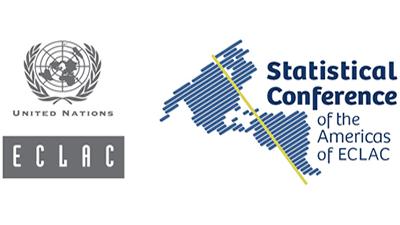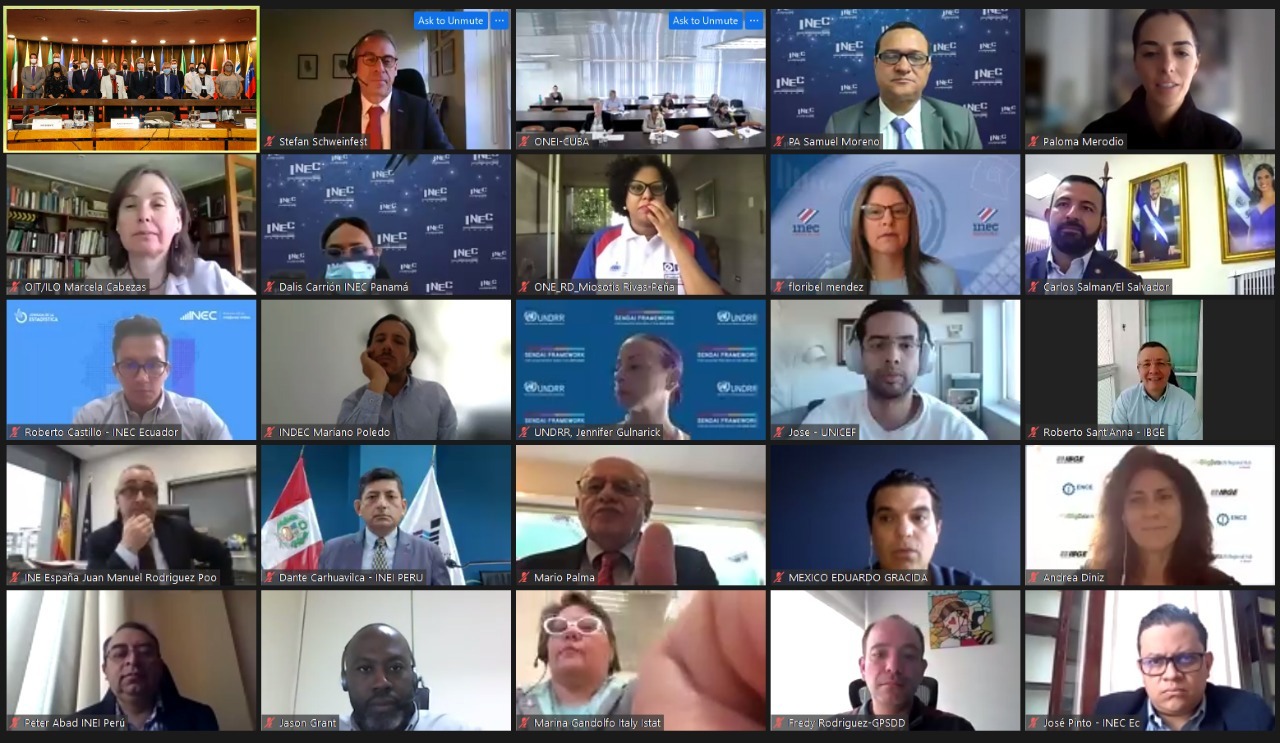
23-25 Nov 2021 Reunión virtual / Virtual meeting, Chile | Conferences and meetings of subsidiary bodies
This eleventh meeting of the SCA-ECLAC, as well as the side-events will be held virtually.

Authorities and representatives of statistics offices in Latin American and Caribbean countries reaffirmed the urgency of measuring gender gaps and quantifying the loss of natural capital and of well-being, and stressed the relevance of consolidating the statistical institutional framework for a post-COVID-19 recovery that would put equality and sustainability at the center, during today’s inauguration of the Eleventh meeting of the Statistical Conference of the Americas (SCA) of the Economic Commission for Latin America and the Caribbean (ECLAC).
Thirty-four (34) of ECLAC’s Member States and 7 of its associate members are participating in the intergovernmental event, which runs through Thursday, November 25. The Conference was inaugurated by Alicia Bárcena, Executive Secretary of ECLAC; Juan Daniel Oviedo, Director-General of the National Administrative Department of Statistics (DANE) of Colombia, in his capacity as Chair of the SCA; and Stefan Schweinfest, Director of the United Nations Statistics Division.
“The difficulties imposed on us by the pandemic have not been an impediment to collaborative regional work that has yielded significant results in these last two years. In fact, thanks to the commitment and dedication of countries, the 2020-2021 biennium is closing with a total of 10 finalized documents, which bring together recommendations and compilations of good practices for strengthening statistical production in various thematic areas, and which we put at the disposal of the entire regional statistical community,” Alicia Bárcena stated in her inaugural speech.
ECLAC’s Executive Secretary emphasized that gender mainstreaming is a central element of the Statistical Conference of the Americas’ work program, and she warned that “the gaps between men and women should not be just another issue. We must break the statistical silence on gender equality.”
Alicia Bárcena added that a major challenge is how to incorporate new data sources into official statistics.
“Information coming from satellites, social networks, the use of mobile telephones, and the use of machine learning algorithms and artificial intelligence is used extensively by private companies and researchers, but it hasn’t been easy to integrate this data into the processes for producing official statistics. Collaboration among countries is essential in this area,” she noted.
She also underscored the urgency of making progress on generating ecosystem accounts and emphasized that the region is at a turning point in terms of obtaining considerable and sustainable results with the adoption of the 2030 Agenda for Sustainable Development.
“Ecosystem accounts will give us the opportunity to have an integrated analysis of the state and quality of natural capital for the region’s countries, strengthening the measurement of the effects of development policies and green growth strategies,” she contended.
The senior United Nations official expressed that ECLAC is carrying out actions to build capacities, with the aim of supporting the region’s countries in the production of accounts on the extent and condition of ecosystems and on ecosystem services, which would promote harmonious growth in the region.
In addition, she pointed up the launch of the new version of the CEPALSTAT data portal, a platform of comparable regional statistics for Latin America and the Caribbean that incorporates international trends and standards for online statistical dissemination, open data formats and the full integration of geospatial information into the statistical data bank through dynamic and easy-to-browse visualization solutions.
“Since what is not measured doesn’t count, let’s keep working together for the statistical development of our Latin America and the Caribbean,” Alicia Bárcena concluded.
Meanwhile, Juan Daniel Oviedo, Director of Colombia’s DANE, gave special recognition to Alicia Bárcena for having stressed the importance of official statistics in the context of the COVID-19 pandemic.
He added that the pandemic has created opportunities for statistics offices, especially in terms of responding to new user needs, such as indicators on real and subjective well-being, and measuring and defining new elements for reconstruction plans.
Finally, Stefan Schweinfest, Director of the United Nations Statistics Division, highlighted the work done by the Statistical Conference of the Americas of ECLAC.
“Over the last 20 years, you have built a very strong, professional community that has developed many tools and recommendations that I believe have strengthened the statistical organizations of Latin America and the Caribbean,” he affirmed.
During the Eleventh meeting of the Statistical Conference of the Americas of ECLAC, authorities will analyze progress and challenges related to consolidating the statistical institutional framework, as well as regional perspectives on the use of new methodologies and data sources.
Member States will also examine the outcomes of the Conference’s Biennial Programme of Regional and International Cooperation Activities 2020–2021, approve the creation of Working Groups for the 2022–2023 period, and elect the new Executive Committee of the Conference for that span.
The Conference includes five side events addressing issues such as the challenges of measuring Foreign Direct Investment in the region; population and housing censuses in pandemic contexts; the XIX international meeting of specialists on time use and unpaid work; Caribbean activities related to measuring environmental, climate change and disasters indicators for policy decision-making; and Latin America and the Caribbean’s perspectives on data governance.